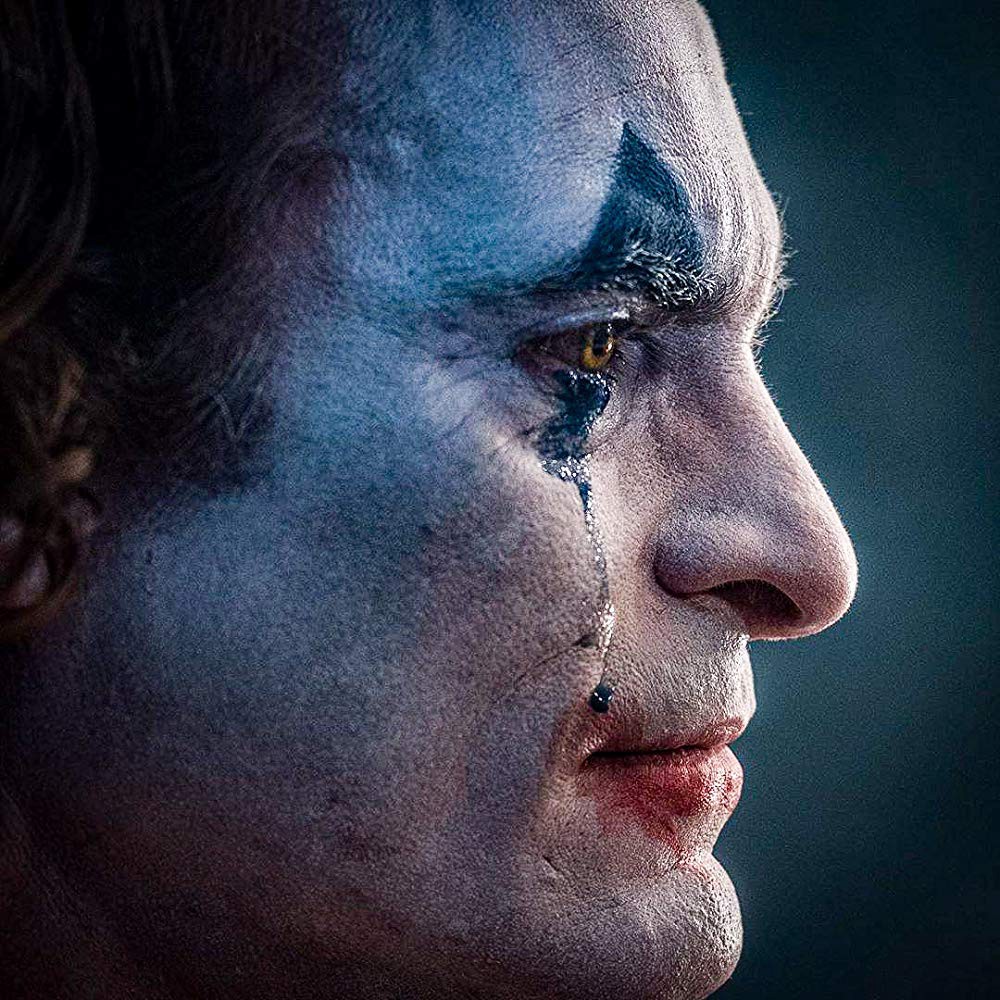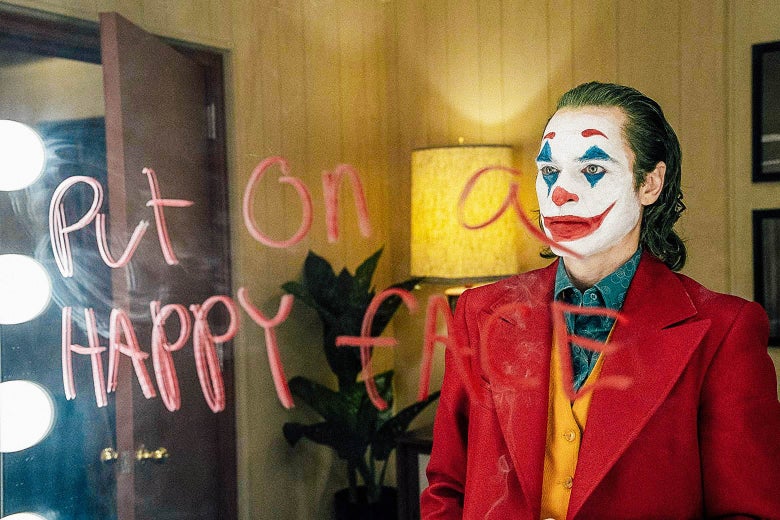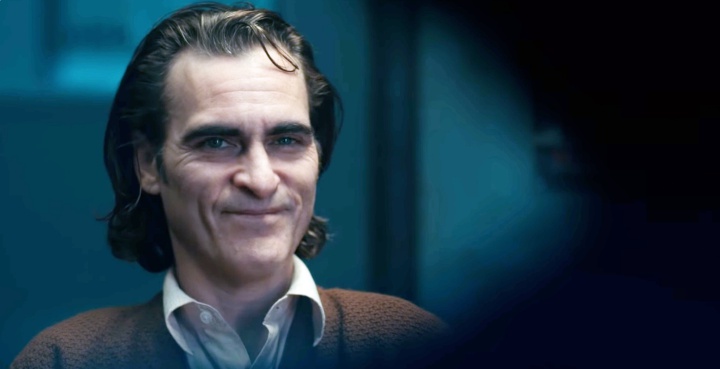Joker (2019)

DIRECTOR: Todd Phillips
CAST: Joaquin Phoenix, Robert De Niro, Frances Conroy, Zazie Beetz, Brett Cullen, Bill Camp, Shea Whigham
REVIEW:
With the simply-titled Joker, an independent stand-alone existing on its own unconnected to any other film in any Batman franchise, director Todd Phillips and star Joaquin Phoenix have gone even further afield of the stereotypical tropes and restrictions of a “comic book movie” than the likes of The Dark Knight, Deadpool, or Logan (rarely for a comic book movie, it shares with the last two examples a well-deserved R rating; this is an adult movie which is thoroughly intended for adults and inappropriate for younger viewers). This is a “comic book movie” in a loose definition of the word, owing more to Scorsese—Taxi Driver and The King of Comedy in particular—than the pages of the Batman comics. Taken on its own merits, Joker is a slow burn but darkly engrossing ride following in gritty, down-to-earth fashion one man’s descent into madness. It’s the kind of movie it’s arguable to say is conventionally “entertaining”, but it’s powerful and disturbing, and not easily shaken off afterwards.
In simplest comic booky terms, Joker is an origin story. The Joker’s real name is left ambiguous on the comic page, but the filmmakers have given him one: Arthur Fleck (Joaquin Phoenix), a miserable sad-sack who lives with his invalid mother (Frances Conroy) and is afflicted with a condition that causes him to burst into involuntary hysterical cackling at inappropriate moments; to make things even more degrading, he carries around a little card explaining this which he regularly has to show to creeped-out strangers. Arthur is a struggling party clown and an even worse aspiring stand-up comedian (his first time onstage falls flat when he can’t stop uncontrollably laughing long enough to deliver a coherent joke). Nor is the world around him doing well either; Gotham City is in the midst of an economic depression, with the city cutting funding to social services, including Arthur’s therapy sessions through which he gets the various forms of medication he’s taking. The only bright spots in his life are his budding romance (?) with the single mother down the hall (Zazie Beetz) who is fairly inexplicably interested in him, and his fixation with popular talk show host Murray Franklin (Robert De Niro), whose show he fantasizes about guesting on someday. But if Arthur is already on shaky ground, events conspire to make the bottom fall out. He gets fired from his job. He finally gets Murray’s attention, but not in the way he wanted; his inept stand-up flop becomes a target of Murray’s mockery in his nightly monologue. And he stumbles across shocking secrets his mother has been hiding from him involving her obsession with billionaire businessman and mayoral candidate Thomas Wayne (Brett Cullen) which may or may not be true, and which may lead to more shocking secrets. Arthur’s already tenuous mental well-being begins to unravel and, armed with a gun ill-advisedly supplied to him by a co-worker, he snaps on the subway while being bullied and beaten and commits his first act of violence. It will not be his last. Soon, Arthur is getting a taste for taking small but escalating acts of vengeance on the world he feels has trod on him….along with dyeing his hair green, wearing clownish makeup off the clock, dressing up in garishly colorful outfits, and calling himself “Joker”.
First things first, anyone who goes into Joker expecting a more conventional “comic book movie” is in for disappointment, as what’s onscreen is far more Taxi Driver than The Avengers. Even The Dark Knight and Logan, whose tones were viewed as groundbreakingly dark and adult for comic book movies, followed more conventional tropes and trajectories than this (of course, both were also superhero movies, while there’s no one heroic to be found here). The movie isn’t completely devoid of comic book references—there’s a Thomas Wayne, albeit a more unsympathetic version than we’re used to, Arkham Asylum, a small appearance by a child Bruce Wayne (Dante Pereira-Olson), some elements borrowed from Joker comic stories, including a backstory as a failed stand-up comedian/clown, and a scene that’s obviously influenced by a very similar one in the graphic novel The Dark Knight Returns, and at least a few moments of fan service, including Arthur coming face-to-face with a child Bruce Wayne, The Joker smearing a bloody smile onto his face, and yet another version of the murder of the Waynes, who by this point have been shot onscreen more times than Spider-Man’s Uncle Ben—but overall this is best viewed as only loosely categorized as a “comic book movie”, and there’s certainly no whiff of any superhero action or derring-do. Both tonally and in its plot, it’s a less-than-subtle mashup of Taxi Driver and The King of Comedy (Martin Scorsese was even once attached as a producer), accentuated by the casting of Robert De Niro, who starred in both films and here plays an inversion of his role in The King of Comedy (in that movie, De Niro played an unstable struggling stand-up comedian obsessed with a successful comedian/talk show host played by Jerry Lewis, while here he’s switched around in the Lewis role).

Much has been made of Joker‘s violence, in fact too much. This is a dark and disturbing movie, but, Taxi Driver-style, the focus is more on an unsettling slow burn powder keg tension than a heavy action/violence quotient. The body count is fairly low, but each moment of violence is depicted unflinchingly—there’s a stabbing that’s particularly graphic—and has a jarring impact. Overblown concerns about the movie “glorifying” violence are unwarranted; there is no glorification. Violence and murder is not treated lightly (except by the man committing it). Lawrence Sher’s cinematography does for Gotham City (filmed in New York City) what Taxi Driver did for 1970s New York City decay—Arthur inhabits a dismal, grimy world—and Hildur Guðnadóttir’s discordant score compliments the action. The year is not specified—though a close inspection of the movies advertised on a theater billboard implies it is 1981—but there’s a heavy ’70s vibe, accentuated by use of songs like Gary Glitter’s “Hey Song” and Cream’s “White Room”. The movie also makes use of the “unreliable narrator” trope. While some scenes are later revealed to have only taken place in the protagonist’s fantasies, the movie leaves quite a bit of room for ambiguity about others. Incidentally, the “unreliable narrator” angle is very much faithful to The Joker in the comics, where he once quipped, “if I have to have a past, I prefer it to be multiple choice” (some might also be reminded of The Dark Knight, wherein Heath Ledger’s Joker spun two completely contradictory backstories at different points of the movie). There’s social/political commentary about social inequality and the often neglectful treatment of people struggling with mental illness, but ultimately, while the movie takes the time to give us a level of understanding of the factors that send Arthur into his downward spiral, it doesn’t glorify or make excuses for him. Early on, there’s room for a little pity, but by the end—and probably well before then—any empathy we might have dries up as Arthur/Joker becomes an increasingly more obviously deranged and disturbing individual.

The movie is a forceful showcase for Joaquin Phoenix, who demonstrated his commitment to the role by shedding fifty pounds (his painfully emaciated frame, ribs jutting grotesquely in unsettling contorted shirtless dance scenes, undoubtedly accentuates the main character’s creepiness) and takes this version of The Joker—or at least a fledgling prototype thereof—to a deep, dark, serious place that only Heath Ledger has previously ventured to; like the late Ledger, Phoenix is fully committed and takes the part seriously rather than treating it like a one-note cackling comic book villain (while Phoenix doesn’t overtly emulate Ledger’s Joker, their versions are much more in similar vein than either is to Jack Nicholson’s or Jared Leto’s, and bear a similar visual aesthetic in their shaggy disheveled hair and smeared-on facepaint). Phoenix plays Arthur as a human being—at least initially, he’s sad and pitiful rather than “villainous”—but doesn’t try to make him more sympathetic than he is; there’s something creepy and off-putting about him right from the start, and the unsettling sense that he’s a powder keg waiting to go off. Later, Phoenix uses changing body language to convey Arthur’s growing, albeit horrifically misguided, sense of empowerment as the meek doormat Arthur is increasingly eclipsed by his flamboyant “Joker” persona, including an eerie slow-motion almost balletic dance in a restroom after his first murders, and later making his debut in full Joker-esque regalia for the first time, including clownish facepaint, green hair, and a garishly colorful suit, prancing down the steps to Gary Glitter’s “Hey Song”. Trying to argue who is “the best” between Phoenix and the late, deservedly much-praised Ledger is a bit of an unfair comparison, given the entirely different contexts and Phoenix playing a slowly evolving fledgling version who only late in the film starts to resemble “The Joker as we know him”, but on a pure acting level, they’re roughly equivalent, and easily the two best live-action versions of the iconic character. It remains to be seen if Phoenix will be nominated for an Oscar, but he should be.
This is The Joaquin Phoenix Show, but there’s other recognizable faces scattered around, including Frances Conroy as Arthur’s equally unwell mother, Zazie Beetz as his pseudo “love interest”, Brett Cullen as a more dislikable Thomas Wayne than we’re used to (this is not Cullen’s first trip to Gotham City; he previously had a small role as the not dissimilar Congressman Gilly in The Dark Knight Rises), a bit part for Brian Tyree Henry, small roles for familiar character actors Bill Camp and Shea Whigham as a couple of detectives with their eyes on Arthur (any resemblance to Jim Gordon and Harvey Bullock is purely coincidental…or not), and of course Robert De Niro (who, for an actor often guilty of slumming and picking up paychecks, seems to be engaged and enjoying himself in what is a fairly small but key role), but everyone else revolves around Phoenix, and none of them get a great deal of screentime.
Together with movies like Deadpool and Logan, Joker demonstrates—in different ways—that “comic book movies”, especially an independent stand-alone unencumbered by ties to a larger continuity, can be fertile ground for creativity instead of all conforming to cookie cutter studio-approved formula. It’s an edgy, daring movie that doesn’t compromise or water itself down from saying what it wants to say, bolstered by a disturbingly magnetic performance by Joaquin Phoenix that should be a shoe-in for awards attention. It most definitely will not be everyone’s cup of tea, especially those looking for conventional superhero action and heroics (which there is no shortage of in other comic book movies), but the umbrella of “comic book movie” is so broad and wide-ranging—or at least it should be—that there ought to be as much room for a movie like Joker as there is for The Avengers, and for those to whom it appeals, it’s a welcome detour off the beaten track of “safe” formula and convention.
* * *